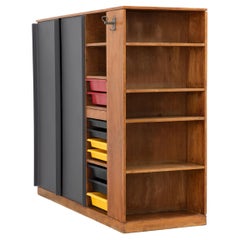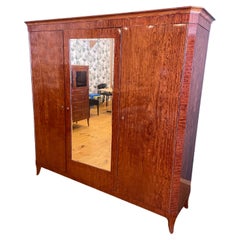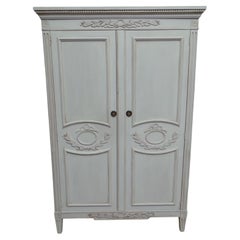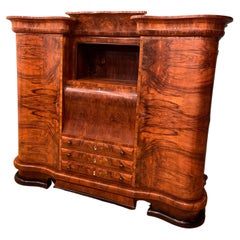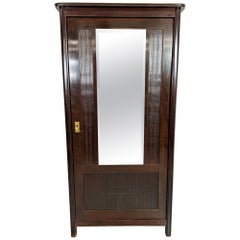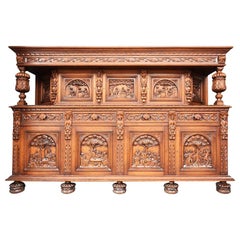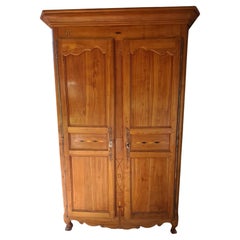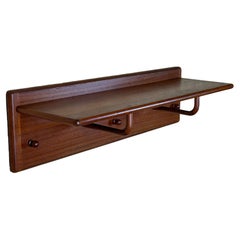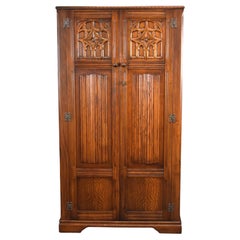Used Wardrobes
Mid-20th Century French Used Wardrobes
Metal
1890s Polish Baroque Used Wardrobes
Palisander
1950s Swedish Gustavian Used Wardrobes
Wood
1920s Polish Baroque Used Wardrobes
Coconut
Early 1900s Hungarian Jugendstil Used Wardrobes
Beech
20th Century French Renaissance Used Wardrobes
Wood
Late 19th Century French Louis XV Used Wardrobes
Wood
1960s Danish Used Wardrobes
Teak
Early 20th Century English Used Wardrobes
Oak
Late 19th Century British Used Wardrobes
Mahogany
Mid-20th Century Mid-Century Modern Used Wardrobes
Teak
Early 20th Century British Used Wardrobes
Oak
1950s Italian Mid-Century Modern Used Wardrobes
Wood
Late 20th Century Unknown Chippendale Used Wardrobes
Wood, Walnut
Early 20th Century British Used Wardrobes
Wood
Early 1900s British Chinoiserie Used Wardrobes
Mirror, Wood
1960s Modern Used Wardrobes
Wood
Late 19th Century English Aesthetic Movement Used Wardrobes
Bamboo, Reed, Wood
Early 20th Century British Used Wardrobes
Wood
1890s Polish Art Nouveau Used Wardrobes
Walnut
1890s Polish Art Nouveau Used Wardrobes
Walnut
Early 20th Century British Used Wardrobes
Wood
Early 1900s French Art Deco Used Wardrobes
Oak
Early 20th Century British Used Wardrobes
Walnut
1920s Polish Baroque Used Wardrobes
Coconut
18th Century Swedish Used Wardrobes
Wood
1980s French Used Wardrobes
Brass
1930s British Art Deco Used Wardrobes
Burl
Mid-20th Century British Mid-Century Modern Used Wardrobes
Teak, Walnut
Mid-20th Century British Mid-Century Modern Used Wardrobes
Teak, Walnut
1940s Italian Art Deco Used Wardrobes
Maple, Parchment Paper
1970s German Used Wardrobes
Metal, Chrome
18th Century and Earlier Used Wardrobes
Late 19th Century French Romantic Used Wardrobes
Wood, Oak
1940s Italian Art Deco Used Wardrobes
Mirror, Walnut, Burl
Mid-18th Century French Louis XV Used Wardrobes
Oak, Pine
1890s French Gothic Used Wardrobes
Wood, Walnut
Early 20th Century Unknown Louis Philippe Used Wardrobes
Wood, Walnut
Mid-19th Century Unknown Louis Philippe Used Wardrobes
Wood
Late 19th Century French Belle Époque Used Wardrobes
Wood, Walnut
Late 19th Century French Louis Philippe Used Wardrobes
Wood
20th Century Art Deco Used Wardrobes
Chrome
19th Century English Early Victorian Used Wardrobes
Pine
18th Century English George III Used Wardrobes
Oak
Late 18th Century English Georgian Used Wardrobes
Mahogany, Pine
1820s German Baroque Used Wardrobes
Walnut
Early 20th Century British Used Wardrobes
Brass
19th Century English Victorian Used Wardrobes
Pine
Early 20th Century British Used Wardrobes
Walnut
1960s Danish Mid-Century Modern Used Wardrobes
Teak
20th Century British Used Wardrobes
Hardwood
1920s Austrian Art Deco Used Wardrobes
Brass
17th Century Italian Renaissance Used Wardrobes
Walnut
1820s German Colonial Revival Used Wardrobes
Wood
Early 19th Century German Biedermeier Used Wardrobes
Softwood, Walnut
20th Century American Art Deco Used Wardrobes
Wood, Maple, Birdseye Maple, Burl
1890s Polish Arts and Crafts Used Wardrobes
Oak
1890s Polish Arts and Crafts Used Wardrobes
Oak
Late 19th Century French Used Wardrobes
Wood
Early 1900s Late Victorian Used Wardrobes
Walnut
- 1
- ...
Used Wardrobes For Sale on 1stDibs
How Much are Used Wardrobes?
Finding the Right Wardrobes And Armoires for You
When shopping for antique and vintage wardrobes and armoires for your home, there are several things to keep in mind, not least of which is question number 1:
What is the difference between an armoire and a wardrobe?
The difference between an armoire and a wardrobe is actually simple: An armoire is merely an ornate wardrobe. A wardrobe is a tall, streamlined storage cabinet that usually has some combination of drawers, shelves and hanging rods.
Antique and vintage armoires, on the other hand, are freestanding, heavy wooden structures that typically feature decorative metal hinges and pictorial carvings. Armoires are large cabinets that aren’t outfitted with the varied storage features that wardrobes now commonly have. Armoires often have one or two doors and a hanging bar and allow for quick access. Whether a minimalist mid-century modern wardrobe or grandiose Victorian-era armoire is the right fit for you, both are highly functional furnishings and can be a smart storage solution.
Armoires have been around since medieval times, and initially they may have housed weapons and armor. In their early days, armoires were often adorned with elaborate carvings and lavish paintings, particularly in Renaissance-era France. During the 18th century and later, armoires were widely known as “presses” for hanging clothes, and they were so large that they swallowed up the room where they stood.
In today’s modern homes, an antique armoire can be a striking, architectural work of art amid comparably unadorned furnishings. Whether you’re using your piece in the kitchen for cookware or as a food pantry, in the bedroom for clothes or in the living room as a media console, it will likely become a lovable focal point.
The evolution of the armoire can be seen in today’s corner wardrobes, which may rest on an asymmetrical base to account for corner placement, and even mirrored wardrobes, which feature a mirror affixed to the inside panel of one of the doors for convenience. Contemporary wardrobes commonly feature additional sliding trays and drawers and hanging space for clothing or linens, and the cabinet doors make them ideal for concealing televisions and computer monitors when such devices aren’t in use.
When choosing the right wardrobe or vintage armoire for your home, it’s good to have the following in mind: What are you planning to store in it? How much of what you’re storing will need to be housed in it? It should be big enough to accommodate your needs. What is the size of the room where your wardrobe or armoire will live? A large new piece of furniture in a modest space can easily become a hindrance if you have to navigate your way around it during your daily routine, so be mindful of the area you'll need in order to move freely.
Whether you are looking for an antique walnut armoire or a simple contemporary wardrobe, find the right piece for your home today on 1stDibs.
- 1stDibs ExpertNovember 6, 2023You can use a variety of other things in place of a wardrobe. Armoires are a popular alternative. These case goods are usually bigger than wardrobes and have more ornate, decorative designs. You may also consider the chifferobe, which has a hanging area for clothing on one side and a chest of drawers on the other. Open clothes racks can also serve as a substitute for a wardrobe. On 1stDibs, shop a large collection of furniture.
Read More
The Ultimate Guide to Types of Tables for the Home
Whether you’re just moving in or ready to give your home a makeover, our guide will give you pointers on tables that are fitting for every room, nook and hallway.
What Exactly Is a Secretary Desk, and What Is It Used For?
The furniture equivalent of a Swiss Army knife, it's the multifunctional piece you didn't know you needed.
This Shelving System with Oxidized Brass Tubes Is Retro and Futuristic at Once
Italian studio DimoreMilano mustered great ingenuity when crafting these sculptural shelves, which are built without any screws.
28 Cheerful Home Bars, Where Everybody (Literally) Knows Your Name
Simple or sophisticated, equipped with console, cart or custom cabinetry, these stylish bar areas deserve a toast.
Ask an Interior Designer: Work-from-Home Edition
Leaping into a design project, whether it's refreshing the bedroom or redoing the whole house, can be overwhelming. Luckily, we know more than a few interior designers. You asked questions on Instagram, and now they're answering.
Collected and Eclectic, ‘Wunderkammern’ Are Back in a Big Way
Introduced nearly 500 years ago, curiosity cabinets are finding new fans among today's collectors and designers.
Meet the Incredible Woman Transforming Fallen Trees into Sleek Furniture
In the hands of New York Heartwoods cofounder Megan Offner, unwanted local trees become works of design art.
These New York Architects Love a Complicated Project
From Brooklyn townhouses to Maine campgrounds, Trattie Davies and Jonathan Toews relish a challenge, like transforming a former warehouse space into the new 1stdibs Gallery.
